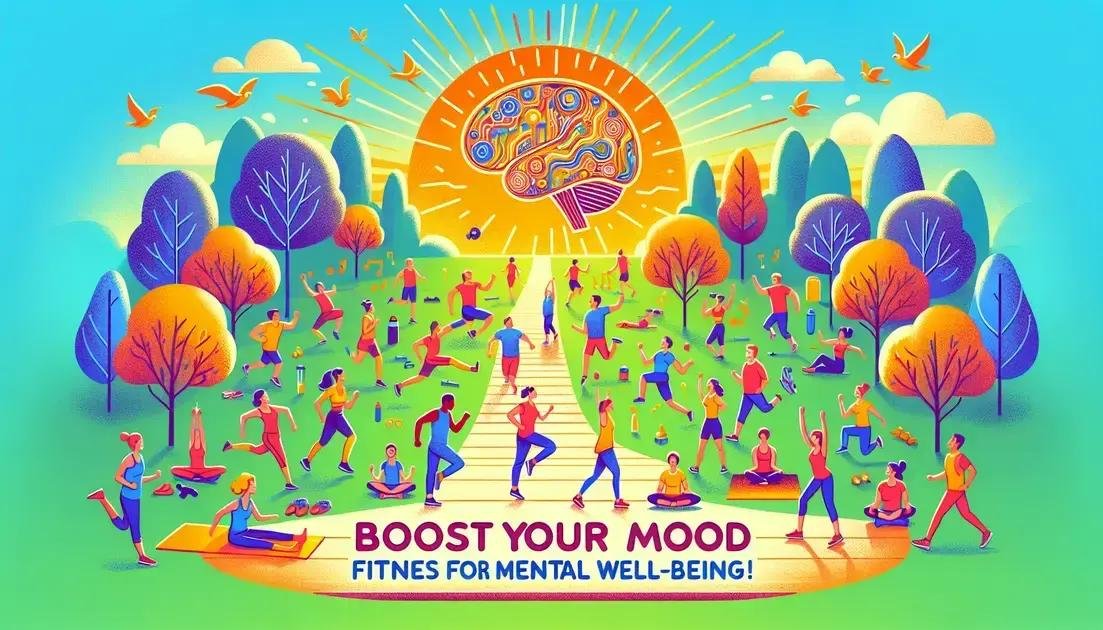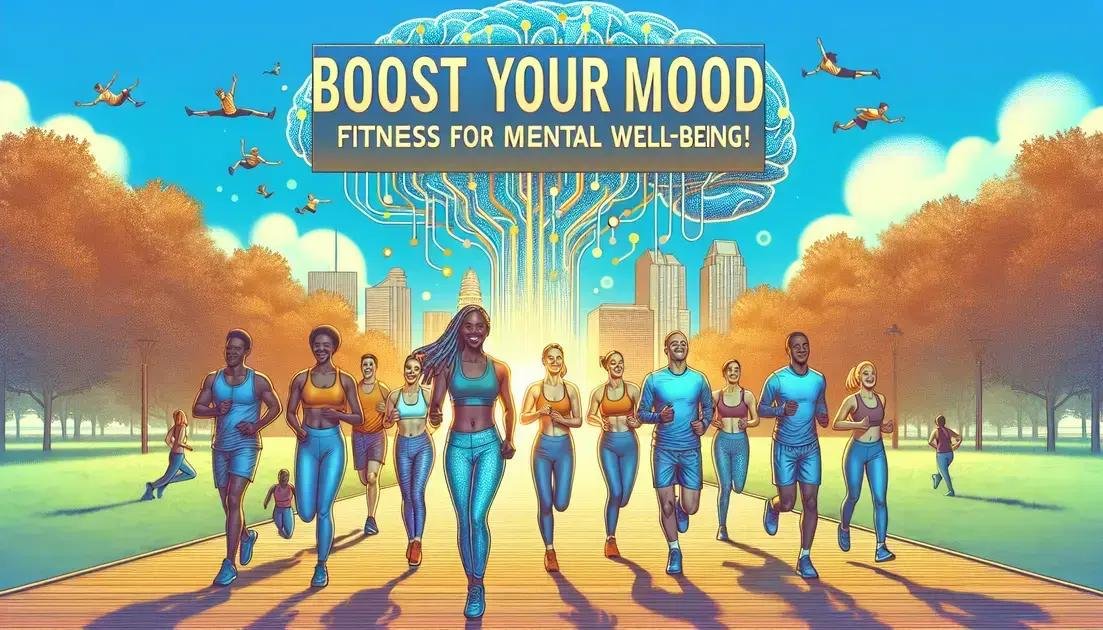
“Boost Your Mood: Fitness for Mental Well-Being!”
-
Maria Duarte
-
8, janeiro, 2025
Topics
 Shared
Shared
Regular physical activity is not just about maintaining physical health but also plays a crucial role in boosting mental well-being.
Numerous studies have shown that exercise can significantly alleviate symptoms of mental health conditions such as anxiety and depression, while also enhancing mood and self-esteem.
Embracing an active lifestyle helps individuals to break away from daily stressors, offers opportunities for social engagement, and promotes a more positive outlook on life.
Understanding the mental health benefits of regular physical activity can empower us to take charge of our mental wellness.
Introduction to Mental Health and Exercise
Physical activity plays a significant role in mental health. Many studies show that exercising releases endorphins, the body’s natural mood lifters. Physical activity can help alleviate feelings of depression and anxiety.
Moreover, engaging in regular exercise promotes better sleep, which is essential for good mental health. It encourages people to interact, reducing feelings of isolation.
Benefits of Regular Exercise
Integrating exercise into daily routines not only boosts physical well-being but also supports emotional resilience. Whether it’s through sports, walking, or group classes, movement has a lasting impact on mental health and contributes to a balanced, happier life.
How Exercise Affects Brain Chemistry

Exercise has a profound effect on brain chemistry that significantly enhances mental health. When you engage in physical activity, your body releases neurotransmitters like serotonin and dopamine. These chemicals are crucial for regulating mood and emotional balance.
Additionally, regular exercise increases the production of brain-derived neurotrophic factor (BDNF), which supports neuron health, promotes brain function, and aids in learning and memory. This biological response helps reduce the symptoms of anxiety and depression, offering a natural boost to mental well-being.
Furthermore, the act of exercising itself is a form of distraction, allowing individuals to detach from daily stressors and negative thoughts. This distraction, combined with biochemical changes, creates a healthier mental state that can lead to a more fulfilling life.
Reducing Anxiety with Physical Activity
Reducing anxiety can be effectively achieved through regular physical activity. When you engage in exercise, your body releases endorphins, which help to improve your mood and create a sense of well-being.
Additionally, physical activity can increase your heart rate, which in turn helps alleviate feelings of anxiety through various physiological processes.
Engaging in workouts such as jogging, cycling, or even brisk walking can serve as a natural outlet for tension. This helps to clear your mind and provides a distraction from stressors that may contribute to anxiety.
Furthermore, the routine and structure that come with regular exercise can foster a sense of stability, which is particularly beneficial for those experiencing anxiety.
Moreover, participating in activities that involve mindful movement, such as yoga or tai chi, integrates relaxation techniques with exercise, further enhancing your ability to manage anxiety.
The combination of breathing exercises and stretching not only promotes physical flexibility but also calms the mind, leading to reduced anxiety levels.
Depression and Exercise: A Natural Remedy

Exercise is increasingly recognized as a natural remedy for depression. Engaging consistently in physical activity can lead to significant improvements in mood and overall mental well-being.
Regular workouts help release endorphins, which are chemicals in the brain that act as natural painkillers and mood elevators.
Moreover, physical activity promotes a sense of accomplishment, as achieving fitness goals or completing workouts can enhance self-esteem. This boost in self-worth counters feelings of worthlessness often associated with depression.
In addition to physiological benefits, exercise fosters social interaction. Group activities or classes create community and support, which can be incredibly valuable for someone struggling with depression. Social engagement not only alleviates loneliness but also encourages accountability and motivation.
Lastly, exercise can help regulate sleep patterns, which is crucial since poor sleep often accompanies depression. Quality sleep supports emotional stability and resilience, helping individuals to cope with life’s challenges.
Boosting Self-Esteem Through Fitness
Boosting self-esteem through fitness is an incredible benefit of regular exercise. When you set achievable goals and see progress, it creates a sense of accomplishment.
Physical activity makes you feel good about yourself and enhances your confidence.
Exercising regularly can lead to physical changes such as weight loss or increased muscle tone, which often contribute to a more positive self-image. These changes can lead to feelings of empowerment, as you take control of your health and fitness.
Community and Support
Furthermore, participating in group workouts or classes fosters a supportive environment. Being part of a community can encourage you to push through challenges and celebrate successes together. This social interaction is valuable for building bonds and gaining positive reinforcement.
Mindfulness, incorporated during exercise, allows you to focus on your body and its capabilities, promoting self-acceptance and gratitude for what your body can achieve.
Overall, fitness is a powerful tool for enhancing self-esteem and embracing a healthier lifestyle.
Social Benefits of Group Exercises

Group exercises offer numerous social benefits that enhance mental health. Participating in a fitness class or team sport creates opportunities for social interaction and bonding. This interaction helps build friendships and a sense of community.
Moreover, working out in a group provides motivation from peers. The energy of a group can encourage individuals to push themselves harder than they might alone. This collective effort fosters a supportive environment where everyone celebrates each other’s achievements.
Engaging with others during exercise also promotes accountability. When you commit to joining a class or group, you are more likely to show up and stay consistent. This consistency can lead to significant improvements in fitness and mental well-being.
Additionally, sharing fitness experiences can strengthen relationships. Whether it is celebrating personal bests or encouraging each other through tough workouts, these moments contribute to lasting bonds.
Physical Activity and Sleep Quality
Physical activity plays a vital role in improving sleep quality. Regular exercise can help you fall asleep faster and deepen your sleep. This is because working out raises your body temperature, and as it cools down afterward, it signals to your body that it’s time to sleep.
Moreover, engaging in moderate aerobic exercises, such as walking or swimming, can reduce feelings of anxiety and stress. This reduction allows for a more restful night. Additionally, exercise increases the production of serotonin, which regulates sleep patterns and enhances the ability to sleep soundly.
Timing is Important
However, timing is important. Exercising too close to bedtime might keep some people awake. Aim to finish workouts at least three hours before sleeping. Establishing a regular exercise schedule can lead to improved sleep routines and better overall health.
Lastly, if you choose group activities or classes, the social interaction involved further supports mental relaxation, paving the way for restorative sleep. Embracing an active lifestyle is essential for both physical and mental wellness, directly impacting sleep quality.
Exercise as a Stress Buster

Exercise serves as a powerful stress buster. Engaging in physical activity leads to the release of endorphins, which are known as the body’s natural stress relievers. These chemicals help improve mood and reduce feelings of tension.
When you’re feeling overwhelmed, even a short walk can provide immediate relief. It helps clear your mind and allows you to process stressful situations more calmly. Additionally, regular exercise can enhance overall mental resilience, making it easier to cope with future stressors.
Participating in activities like yoga and tai chi combines physical exercise with mindfulness practices. These activities not only promote fitness but also help center the mind and foster relaxation, making them especially effective at reducing stress.
Finally, the sense of achievement that comes from regular exercise can boost self-confidence and self-esteem. This increased confidence further contributes to lowering stress levels, creating a positive cycle of wellness.
Mindfulness in Movement: Yoga and Tai Chi
Mindfulness in movement, such as yoga and tai chi, offers mental health benefits by combining physical exercise with present moment awareness.
Yoga promotes emotional regulation through breath control and body alignment, while tai chi emphasizes gentle movements that foster relaxation and inner peace.
Benefits of Practice
Both practices enhance self-awareness and focus, and encourage a supportive community through group participation.
Building Resilience Through Physical Fitness

Building resilience through physical fitness is key to enhancing mental strength. Regular exercise prepares your body to handle stress more effectively. When you engage in physical activities, your body learns to manage not only physical challenges but emotional ones too.
Exercise promotes the release of endorphins, which help improve mood and combat feelings of distress. This chemical response nurtures a more positive mindset, allowing individuals to bounce back more quickly from setbacks.
Additionally, setting and achieving fitness goals, whether it’s lifting heavier weights or completing a race, cultivates a sense of accomplishment. This boosts confidence, which reinforces the belief that one can overcome obstacles in other areas of life.
Participating in group training or team sports also fosters a support network. Sharing experiences with others can provide encouragement and motivation, helping to develop a sense of belonging and community that is vital for personal growth.
Longevity and Mental Well-being
Longevity and mental well-being are strongly connected through regular physical activity. Engaging in consistent exercise helps to boost brain health and enhance cognitive function. People who remain active are less likely to experience cognitive decline as they age.
Physical activity promotes the release of neurotransmitters such as serotonin and dopamine, which are essential for maintaining a positive mood. This chemical boost contributes to improved emotional health, lowering the risk of depression and anxiety.
Benefits of a Healthy Lifestyle
Moreover, a healthy lifestyle that includes regular exercise can lead to a longer life by reducing the risk of chronic diseases such as heart disease, diabetes, and obesity. By managing weight and improving heart health, individuals enhance not only their longevity but also their quality of life.
Participating in group exercise routines can provide social connections that further promote mental well-being. Feeling supported by a community can increase motivation and commitment to a healthy lifestyle.
Making Fitness a Sustainable Habit

Making fitness a sustainable habit is essential for long-term health and well-being.
To start, it’s important to set realistic goals that can be easily integrated into daily life. Small changes, like choosing to walk or bike instead of driving, can lead to significant health benefits over time.
Creating a routine
is another effective strategy. Scheduling workouts like appointments helps prioritize fitness in a busy life. Try to find activities that you enjoy, whether it’s dancing, swimming, or hiking, as enjoyment keeps motivation high.
Additionally, tracking progress can motivate individuals to stay on course. Using apps or journals to record workouts and achievements promotes accountability and a sense of accomplishment.
Lastly, surrounding oneself with supportive friends or joining a fitness community can enhance commitment. Sharing goals and experiences with others encourages consistency and makes exercise more enjoyable.
These strategies contribute to making fitness a natural part of everyday life.
Conclusion
Integrating regular physical activity into daily life offers profound benefits for mental health. From reducing anxiety and depression to enhancing self-esteem and sleep quality, the mental health benefits of fitness are vast.
Group exercises provide social connections, while mindfulness practices like yoga aid in stress management.
Building resilience through physical fitness can lead to longer, healthier lives. By making fitness a sustainable habit, individuals can not only improve their physical well-being but also nurture their mental health for years to come.
FAQ – Mental Health and Exercise
How does exercise affect mental health?
Exercise boosts mood by releasing endorphins, reducing anxiety, and improving self-esteem.
Can physical activity help reduce anxiety?
Yes, regular physical activity can lower anxiety levels by providing a positive outlet for stress.
Is exercise a natural remedy for depression?
Absolutely, exercise helps combat depression by promoting the release of mood-enhancing neurotransmitters.
What are the social benefits of group exercises?
Group exercises foster community, motivation, and accountability, enhancing overall mental well-being.
How does physical activity affect sleep quality?
Regular exercise improves sleep quality, helping you fall asleep faster and enjoy deeper sleep.
What strategies can help make fitness a sustainable habit?
Setting realistic goals, creating a routine, tracking progress, and finding social support are key strategies.
 Return blog
Return blog